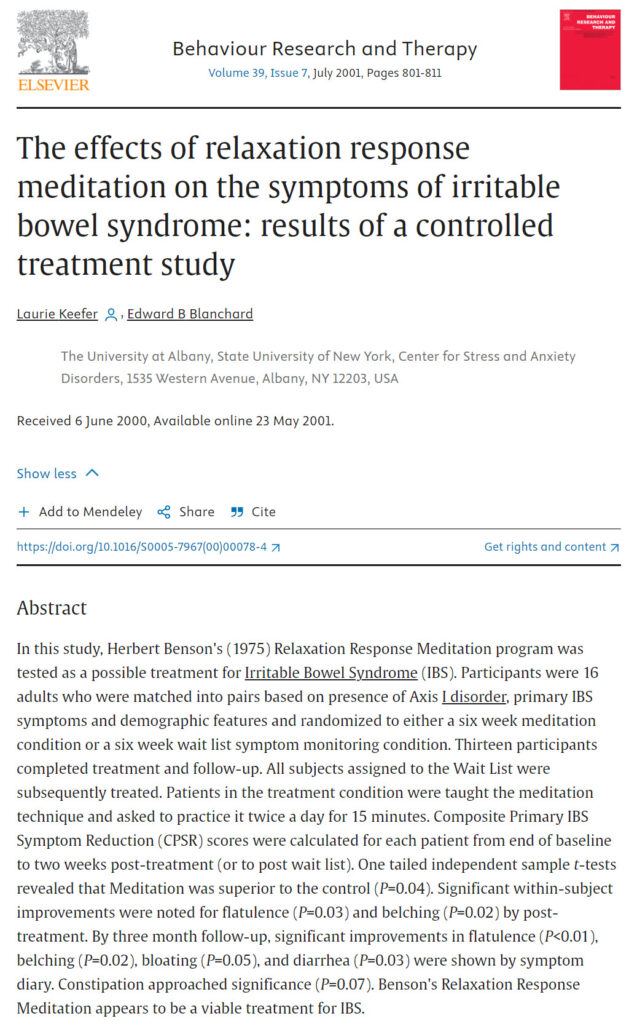In this study, Herbert Benson’s (1975) Relaxation Response Meditation program was tested as a possible treatment for Irritable Bowel Syndrome (IBS). Participants were 16 adults who were matched into pairs based on presence of Axis I disorder, primary IBS symptoms and demographic features and randomized to either a six week meditation condition or a six week wait list symptom monitoring condition. Thirteen participants completed treatment and follow-up. All subjects assigned to the Wait List were subsequently treated. Patients in the treatment condition were taught the meditation technique and asked to practice it twice a day for 15 minutes. Composite Primary IBS Symptom Reduction (CPSR) scores were calculated for each patient from end of baseline to two weeks post-treatment (or to post wait list). One tailed independent sample t-tests revealed that Meditation was superior to the control (P=0.04). Significant within-subject improvements were noted for flatulence (P=0.03) and belching (P=0.02) by post-treatment. By three month follow-up, significant improvements in flatulence (P<0.01), belching (P=0.02), bloating (P=0.05), and diarrhea (P=0.03) were shown by symptom diary. Constipation approached significance (P=0.07). Benson’s Relaxation Response Meditation appears to be a viable treatment for IBS.
The effects of relaxation response meditation on the symptoms of irritable bowel syndrome: results of a controlled treatment study
Publication
Behavior Research and Therapy
39(7):801-11
Abstract
Web and Email Links
Related Listings
Journal
Headache, the Journal of Head and Face Pain
PHYSIOLOGIC CHANGES consistent with the decreased sympathetic nervous system activity are present during the practice of a relaxation technique, Transcendental Meditation. The changes consist of decreased oxygen consumption, carbon dioxide elimination, respiratory rate and minute ventilation. Arterial blood lactate decreases markedly. Arterial blood pH and base excess decrease slightly. There are no changes in arterial blood pressure, in respiratory quotient, nor in rectal temperature […]
Journal
Yoga Alliance
About This Workshop 70-90% of all primary care visits in America are related to chronic stress and stress-related illnesses such as anxiety, depression, PTS, heart disease, headaches, GI disruptions, and more. In the next workshop of the Scientific Research series, Yoga Alliance Director of Research, Dr. Sat Bir Singh Khalsa is joined by Dr. John Denninger, Director of Research at the Benson-Henry Institute for Mind Body Medicine at Massachusetts General Hospital and Harvard Universit […]
Journal
Journal of the American Heart Association
·
Provides 37 pages of summaries from decades of research concerning how meditation affects heart related functioning (blood pressure, heart rate, etc.) Abstract Despite numerous advances in the prevention and treatment of atherosclerosis, cardiovascular disease remains a leading cause of morbidity and mortality. Novel and inexpensive interventions that can contribute to the primary and secondary prevention of cardiovascular disease are of interest. Numerous studies have reported on the […]

